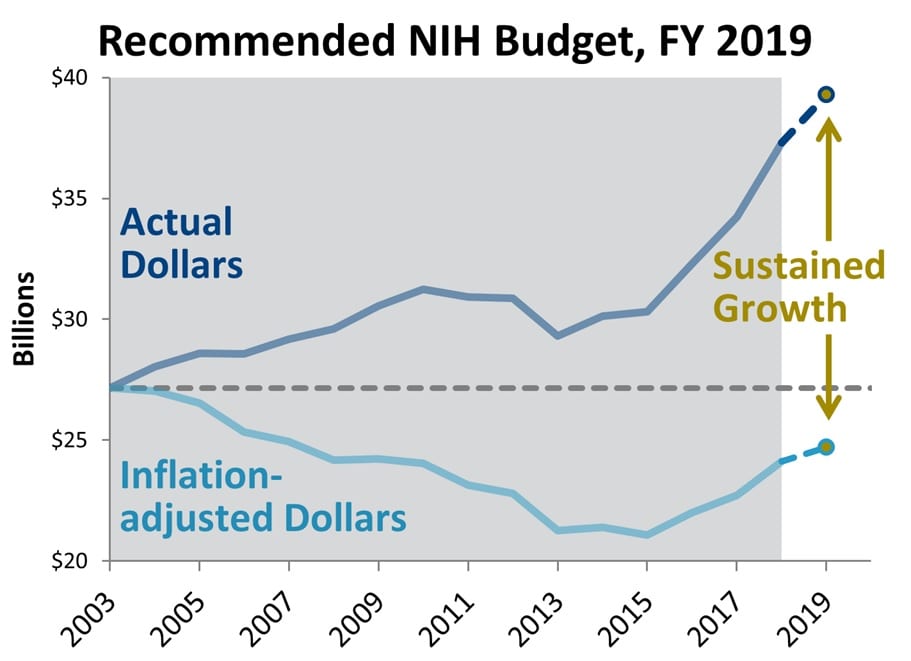Posted by: Nikki Meadows, PhD, ASHG/NHGRI Genetics & Public Policy Fellow
Last month, the U.S. Congress approved legislation establishing a $2 billion (or 5.1%) funding increase for the National Institutes of Health (NIH) in Fiscal Year (FY) 2019. NIH’s total funding for FY 2019 is $39.1 billion. This includes increased funding for several priority research initiatives, such as the Cancer Moonshot and the All of Us research Initiative.
Increase Will Support New Priorities in Genetics and Genomics
The legislation (H.R. 6157) was signed into law by President Trump on September 28, after passing both the Senate (93-7) and the House (361-61). The $2 billion boost is the fourth consecutive increase in the NIH budget in recent years, demonstrating strong bipartisan support for biomedical research in Congress. Significantly, it is the first time in over 20 years that Congress has finalized the NIH budget on time.

In addition to Congress being able to allocate funding for specific research initiatives, the annual appropriations bill also gives Congress an opportunity to issue directives to federal agencies, such as establishing how an agency should proceed on a particular activity or commissioning a report about a particular topic. One such directive you may be familiar with is the so-called “Dickey-Wicker Amendment,” which forbids the use of federal research dollars on any research that harms human embryos. In the FY 2019 appropriations, there are three directives related to genetics and genomics:
- Representatives Marcy Kaptur (D-OH) and Katherine Clark (D-MA) advanced an amendment protecting the genetic privacy of individuals seeking family reunification. The amendment directs the Office of Refugee Resettlement to ensure the protection and privacy of genetic material, data, or information of children, parents, and all of the individuals being tested and their relatives.
- A Government Accountability Office report was commissioned to analyze the medical genetics workforce nationwide. The report is asked to determine whether there are a sufficient number of qualified professionals to serve this growing health need and whether there are any geographic areas that lack access to genetic counseling professionals.
- An amendment from Senator Marco Rubio (R-FL) requires the HHS Secretary to submit a report on the circumstances in which the Centers for Medicare and Medicaid Services may be providing payments to, or otherwise funding, entities that process genome or exome data in the People’s Republic of China or the Russian Federation.
Funding Bill’s Timely Passage Will Help with Long-Term Planning
The fiscal year runs from October 1 through September 30 of the following year, and each year, Congress is required to establish funding for upcoming fiscal year. For the past 21 years, Congress has missed the deadline, and in order to avoid a government shutdown, had to pass a Continuing Resolution (CR) that agreed to continue to fund the government until a new spending bill was completed. Indeed, such a scenario caused brief shutdowns last winter.
This year, the Department of Health and Human Services, which includes NIH, was funded through all of FY 2019, so there is no possibility of a shutdown for NIH. The budget’s timely passage means that institutes and centers can plan for the year ahead knowing what funds are available. However, other agencies, including the National Science Foundation, are currently funded by a CR until December 7, 2018, and funding for these agencies in FY 2019 remains uncertain.
